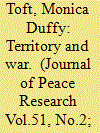| Srl | Item |
| 1 |
ID:
128866


|
|
|
|
|
| Publication |
2014.
|
| Summary/Abstract |
In the past four decades scholars have produced a large literature on the relationship between territory and war. What is clear is that territory has been and will continue to be a core issue in explaining the escalation and onset of war and that territory has peculiar features that impact whether and how a conflict evolves and ends, and the nature of the peace that follows. These dynamics have received significant consideration theoretically and empirically. Although research initially centered on interstate wars, focus broadened to include intrastate or civil wars. On the methodological side, scholarship has taken a quantitative shift. The article concludes that both theorizing and empirical testing have become increasingly sophisticated.
|
|
|
|
|
|
|
|
|
|
|
|
|
|
|
|
| 2 |
ID:
141226


|
|
|
|
|
| Summary/Abstract |
To date, little attention has been paid to the question of how episodes of mass killing are terminated. This has allowed several misconceptions, such as the notion that external armed intervention is a principal form of ending, to arise and profit. This study presents preliminary findings from a survey of cases of state perpetrated mass killing since 1945. It examines the forms of ending, finding that around half end only when the perpetrators themselves decide to end the killing, usually because they have accomplished their goals. It also explores the relationships between modes of termination and lethality and the resilience of different types of ending and offers insights into the implications for policy of some of these findings. It argues that foreign armed intervention is extremely rare and does not deserve, therefore, to be the common ‘go to’ option of advocates and analysts. Instead, presuming that armed intervention is off the table, it is more important to think in terms of what can be done to shape the perpetrators’ incentive structures or encourage internal dissent within the perpetrating elite. Finally, it shows that there is no easy overlap between what is morally palatable and what saves lives. Arming rebels may be morally pleasing, but may lead to protracted civil wars with atrocities – the worst of all outcomes. Likewise, negotiating to secure the state perpetrators’ core interests may feel immoral but might stop the killing and save lives.
|
|
|
|
|
|
|
|
|
|
|
|
|
|
|
|
| 3 |
ID:
188052


|
|
|
|
|
| Summary/Abstract |
While existing research on terrorist group termination examines numerous factors explaining why some terror groups end their campaigns of violence, these studies do not sufficiently address the impact that the actors who actively fight these groups have on the probability of a group’s demise. This paper explores the effect of gendarmeries on terrorist group termination. Gendarmeries may either contribute positively to the counterterrorism efforts of the state with their policing and military operations, or they may undermine these efforts to the extent that they become unaccountable to the state for their actions. Lax accountability may lead to principle-agent problems, resulting in an increase in the risk of those groups engaging in repressive or rent-seeking actions, which can undermine support for the government and contribute to the survival of the terror group. It is argued that the competing ways in which gendarmeries can affect counterterrorism efforts are conditioned by the bureaucratic effectiveness of the state in managing the activities of gendarmerie forces and by the state’s commitment to upholding the rule of law. The results of empirical analyses reveal that having gendarmeries increases a terrorist group’s chance of ending their campaign of violence but decreases the likelihood of a group’s demise in states marked by lower bureaucratic effectiveness and weak rule of law.
|
|
|
|
|
|
|
|
|
|
|
|
|
|
|
|